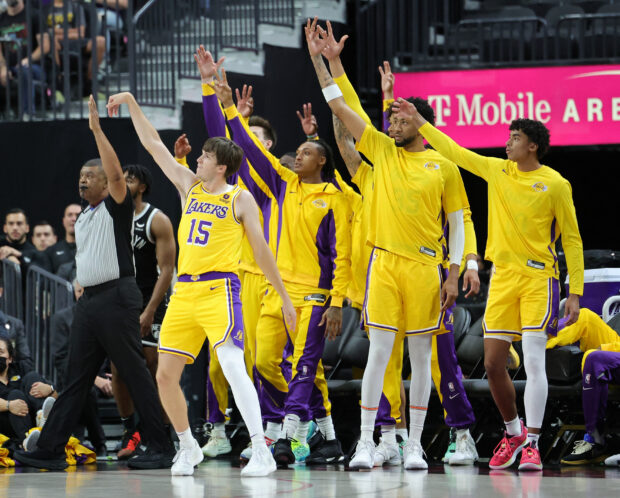
FILE–Austin Reaves #15 of the Los Angeles Lakers and his teammates on the bench follow his 3-point shot attempt against the Brooklyn Nets in the first quarter of their preseason game at T-Mobile Arena on October 09, 2023 in Las Vegas, Nevada. Ethan Miller/Getty Images/AFP
Austin Reaves intends to spend this season competing for a championship. And that’s why he thought it made perfect sense to spend his offseason competing for one as well.
For about 50 NBA players — including 12 from the U.S. — this was not an ordinary summer filled with workouts and vacations. The Basketball World Cup was held in the Philippines, Japan and Indonesia in August and September, and for those who were there playing for their country it could serve as a serious springboard into this NBA season.
Between training camps, exhibition games and the tournament itself, the World Cup players got to play highly competitive basketball for six weeks or more. And that sort of preparation has obvious benefits, Reaves said.
“I’ve been able to learn a lot from a lot of really good players, a lot of really good coaches that basically just see that I belong,” said Reaves, the sharpshooting guard for the Los Angeles Lakers. “Obviously, there’s things to work on, but I think I can hit the ground running from the start of the year … and attack the NBA season.”
From a results standpoint, the summer didn’t go as planned for the Americans. The U.S. finished fourth in the World Cup, good enough of a finish to qualify for next summer’s Paris Olympics but obviously not good enough to come home with a medal. Germany won gold, Serbia (with Bogdan Bogdanovic leading the way) silver and Canada (paced by Shai Gilgeous-Alexander, Dillon Brooks, Kelly Olynyk and RJ Barrett) beat the Americans for bronze.
That means a whole lot of players returned to their NBA teams with a major sense of accomplishment from the summer — certainly different than what would have been the case had the summer been about just playing 1-on-0 or in 5-on-5 workouts with guys from a local gym.
FILE– Franz Wagner #22 of the Orlando Magic dribbles against the Chicago Bulls during the first half at United Center on February 13, 2023 in Chicago, Illinois. Michael Reaves/Getty Images/AFP
“I definitely learned a lot and what I learned, I want to bring to this,” said Orlando forward Franz Wagner — who helped lead Germany to the gold medal, by far the country’s biggest team basketball accomplishment yet. “At the end of the day, this is basketball. We’re trying to build a winning culture. Being part of that team, there are certain things that I learned from them that we can apply to our group.”
Wagner and brother (and Magic teammate) Moritz Wagner played for Germany, which beat the U.S. in the semifinals — a team that just happened to have Magic forward Paolo Banchero on its roster.
Banchero probably could do without the ribbing that the Wagners can throw his way because they won gold this summer. But the reigning NBA rookie of the year was thrilled by one part of what he saw from Germany at the World Cup — a penchant by Franz Wagner for taking over games at the biggest times.
“He was a star. He took that joint over. Best player on the floor, every game he played in,” Banchero said. “For him, just bringing that same attitude here, you want to see Franz be aggressive. Not many guys can stop him. Him taking that mentality of being the best player on the floor, I would love to see him bring that mentality to our team.”
Indiana’s Tyrese Haliburton, another player for the U.S. this summer, said he went into his first World Cup knowing it would make him better.
He was right. He just didn’t fully understand how much he’d learn until he actually went through the summer, and left Manila last month completely convinced that he was as prepared as can be for what awaits this summer with the Pacers.
FILE–Tyrese Haliburton #0 of the Indiana Pacers against the Los Angeles Lakers at Gainbridge Fieldhouse on February 02, 2023 in Indianapolis, Indiana. Andy Lyons/Getty Images/AFP
“You have to get better just being part of that every day with all the other great players, great coaches, seeing how their minds work and things like that,” Haliburton said. “I’ll just take these experiences, obviously the losses and the wins and all the good and the bad and just use it all throughout the season.”
There’s a precedent for players using the summer as a launching pad into the NBA season. Case in point: Derrick Rose, who started for the U.S. team that won gold at the 2010 world championships (the tournament now called the World Cup) and became the NBA MVP the following season. He did that under coach Tom Thibodeau in Chicago; Thibodeau now coaches in New York, and the Knicks have Jalen Brunson and Josh Hart coming off World Cup runs this summer.
“This experience,” Brunson said this summer, “has made me better.”
The benefits aren’t just there for players.
Miami coach Erik Spoelstra — a USA Basketball assistant under Golden State’s Steve Kerr this summer — said spending nearly two months in a basketball thinktank made him sharper as well and called the “professional growth opportunities … unparalleled.”
“You’re already in that mode of putting together practice plans, putting together big-picture six-week plans, going through a training camp and figuring out what’s the best way to fast-track that short period of time,” Spoelstra said. “But the other part is equally as valuable and impactful. The professional growth development, being around great basketball minds, great players and really talented people in the USA program, Sean Ford and Grant Hill just to name a couple, that’s everything that I wanted at this point in my career.”